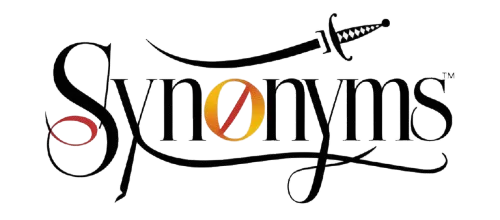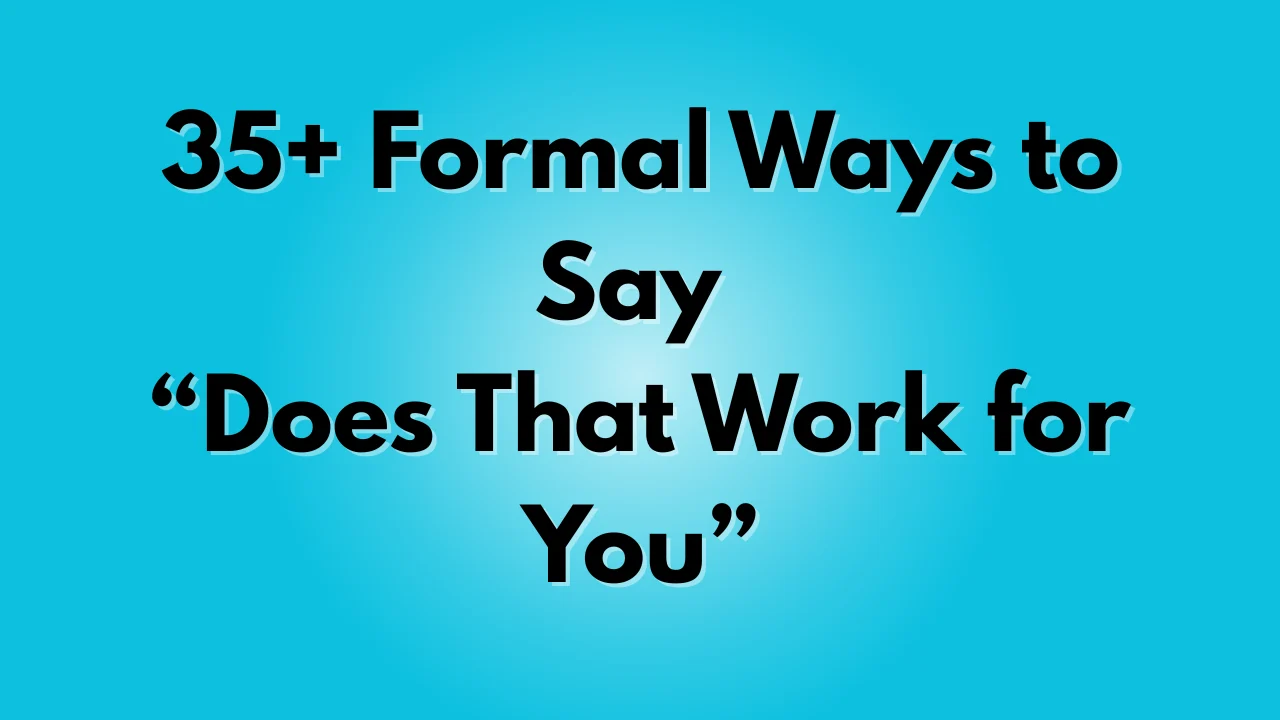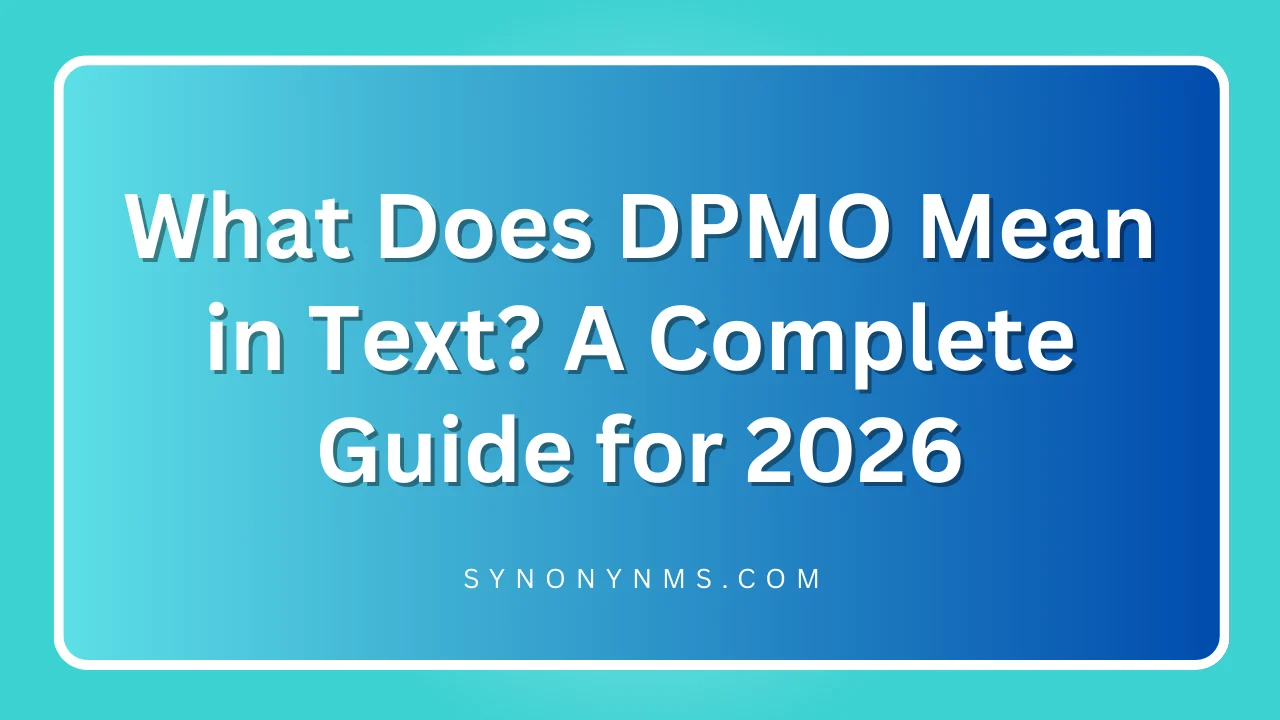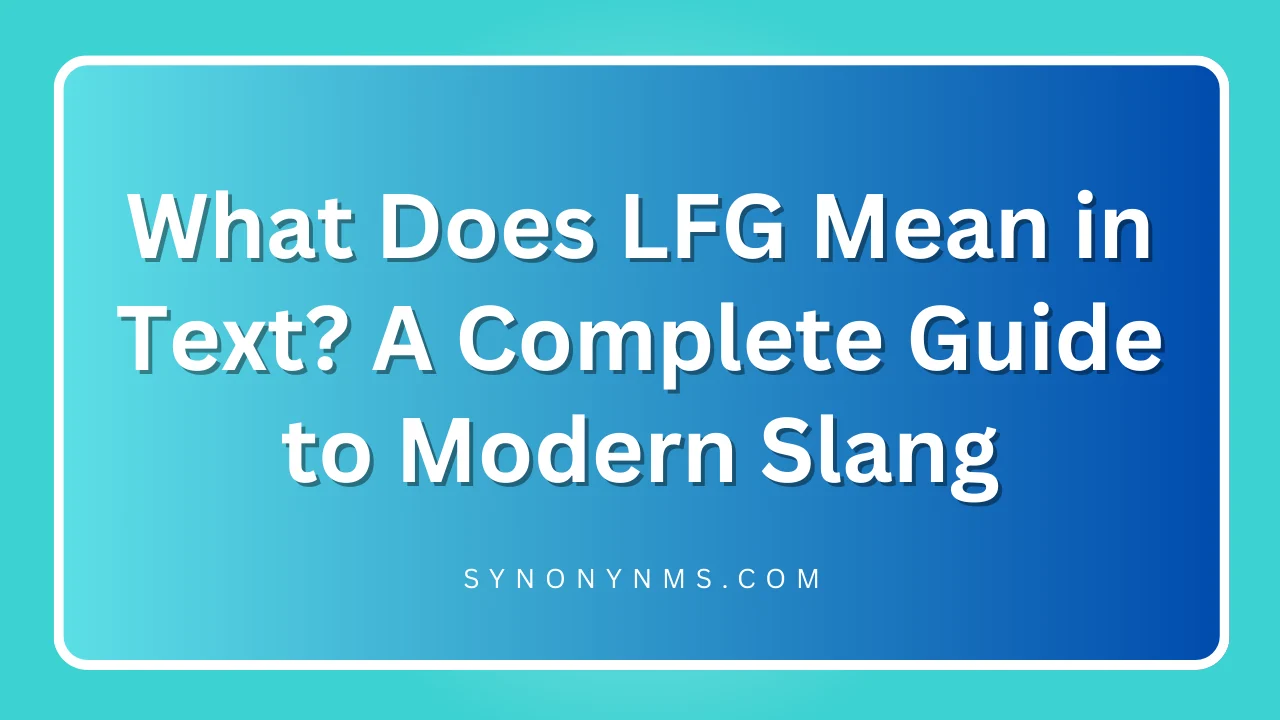The phrase “Does that work for you?” is one of the most common ways to confirm agreement or scheduling in professional communication. It’s short, clear, and polite — perfect for checking if a meeting time, suggestion, or plan suits someone.
However, while effective, it can sound too casual or repetitive in formal business emails, client messages, or high-level correspondence. Choosing a more refined and professional alternative helps maintain respect, clarity, and tone consistency across your communication.
In this guide, you’ll discover 35+ formal ways to say “Does that work for you” — each with its meaning, tone, and example. Whether you’re confirming meeting times, delegating tasks, or finalizing project details, these alternatives will make your writing sound polished, confident, and professional.
What Does “Does That Work for You” Mean?
The phrase “Does that work for you?” is a polite question that checks if the other person agrees with or is comfortable with a proposed plan, time, or arrangement.
Example:
Let’s meet on Tuesday at 2 PM — does that work for you?
It’s friendly and conversational, but not always formal. While ideal for internal communication, it might feel too casual when writing to clients, executives, or external stakeholders.
That’s why varying your phrasing can help you maintain both professional tone and clear communication.
When to Use It
Use “Does that work for you?” or its formal equivalents when you need to:
- Confirm meeting times or schedules.
- Request agreement on a proposed action.
- Coordinate decisions between teams or clients.
- Seek approval or availability in professional settings.
Examples:
- Would Wednesday at 3 PM suit your schedule?
- Please let me know if this arrangement aligns with your plans.
These alternatives can be used in emails, meeting invites, client messages, or project updates — anywhere professionalism and courtesy matter.
Is It Polite or Professional?
Yes, “Does that work for you?” is polite, but it’s more casual than formal. In business communication, tone matters.
When writing to a manager, client, or senior executive, using more formal alternatives like “Would this be convenient for you?” or “Please confirm if this aligns with your availability” creates a better impression.
The right alternative depends on your relationship, context, and tone — from friendly internal emails to official correspondence.
35+ Formal Ways to Say “Does That Work for You”
Here are polished alternatives with meanings, tones, and examples you can use in your professional communication.
🔹 Formal & Polite Alternatives
- Would this be convenient for you?
Example: Would this be convenient for you to discuss on Thursday afternoon?
Tone: Courteous and formal; ideal for client or executive emails.
- Does this align with your schedule?
Example: Does this align with your schedule for next week’s meeting?
Tone: Professional and respectful.
- Would this time suit you?
Example: Would this time suit you for a quick follow-up call?
Tone: Polite and flexible.
- Would you be available at that time?
Example: Would you be available at that time to review the proposal?
Tone: Formal and considerate.
- Please confirm if this works on your end.
Example: Please confirm if this works on your end so we can finalize the meeting details.
Tone: Polite and straightforward.
- Does this time fit your availability?
Example: Does this time fit your availability for a brief discussion?
Tone: Formal and practical.
- Would this arrangement be suitable for you?
Example: Would this arrangement be suitable for you and your team?
Tone: Polished and professional.
- Kindly let me know if this suits your schedule.
Example: Kindly let me know if this suits your schedule by tomorrow morning.
Tone: Respectful and gentle.
- Would this be a convenient time for you?
Example: Would this be a convenient time for you to connect on Zoom?
Tone: Courteous and refined.
- Please let me know if the proposed time works for you.
Example: Please let me know if the proposed time works for you or if we should adjust it.
Tone: Professional and clear.
🔹 Polished Business Alternatives
- Would this fit within your schedule?
Example: Would this fit within your schedule on Friday morning?
Tone: Formal and smooth.
- Can you accommodate this time?
Example: Can you accommodate this time for the upcoming session?
Tone: Formal yet direct.
- Please advise if this suits your availability.
Example: Please advise if this suits your availability for next week’s call.
Tone: Businesslike and diplomatic.
- Would this be an acceptable time?
Example: Would this be an acceptable time to review the materials?
Tone: Formal and polished.
- Does this arrangement suit your calendar?
Example: Does this arrangement suit your calendar for next Tuesday?
Tone: Respectful and time-conscious.
- Would you be comfortable with this time?
Example: Would you be comfortable with this time, or would you prefer an alternative?
Tone: Thoughtful and courteous.
- Please let me know if this schedule works for you.
Example: Please let me know if this schedule works for you and your team.
Tone: Neutral and polite.
- Would this be appropriate for your timing?
Example: Would this be appropriate for your timing on Wednesday morning?
Tone: Formal and gentle.
- Would you be able to make this time?
Example: Would you be able to make this time for the presentation review?
Tone: Polite and flexible.
- Does this correspond with your availability?
Example: Does this correspond with your availability for next week?
Tone: Elegant and formal.
🔹 Warm & Respectful Alternatives
- Let me know if this suits your plans.
Example: Let me know if this suits your plans for the upcoming meeting.
Tone: Friendly and professional.
- Would this be feasible for you?
Example: Would this be feasible for you on short notice?
Tone: Formal yet practical.
- Please let me know if this aligns with your commitments.
Example: Please let me know if this aligns with your commitments for next week.
Tone: Respectful and thoughtful.
- Would this time be manageable for you?
Example: Would this time be manageable for you to join the briefing?
Tone: Polite and understanding.
- I hope this timing suits you well.
Example: I hope this timing suits you well and doesn’t conflict with other meetings.
Tone: Warm and considerate.
- Would this time be agreeable to you?
Example: Would this time be agreeable to you for our discussion?
Tone: Formal and elegant.
- Please confirm if this proposal works for you.
Example: Please confirm if this proposal works for you so we can proceed.
Tone: Professional and direct.
- Would this option be suitable for you?
Example: Would this option be suitable for you and your availability?
Tone: Polite and refined.
- Can you confirm if this fits your schedule?
Example: Can you confirm if this fits your schedule for next Thursday?
Tone: Polite and efficient.
- Would this timing be acceptable to you?
Example: Would this timing be acceptable to you and your team members?
Tone: Formal and respectful.
🔹 Concise & Email-Friendly Variations
- Does this work on your end?
Example: We can schedule it for Tuesday — does this work on your end?
Tone: Neutral and email-friendly.
- Please confirm your availability.
Example: Please confirm your availability for a 2 PM call.
Tone: Professional and concise.
- Let me know your thoughts on this timing.
Example: Let me know your thoughts on this timing before I send the invite.
Tone: Friendly yet respectful.
- Would this slot suit your calendar?
Example: Would this slot suit your calendar for next week’s discussion?
Tone: Polished and professional.
- Kindly confirm if this timing works.
Example: Kindly confirm if this timing works so we can proceed.
Tone: Courteous and flexible.
Conclusion
“Does that work for you?” is simple and effective, but using formal alternatives like “Would this be convenient for you?” or “Please confirm if this fits your schedule” can elevate your professional communication. These 35 refined alternatives allow you to express the same intent with tact and sophistication — whether you’re coordinating with clients, colleagues, or management. By choosing the right phrase for each situation, you’ll ensure your communication remains respectful, clear, and polished every time.



